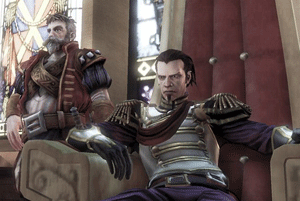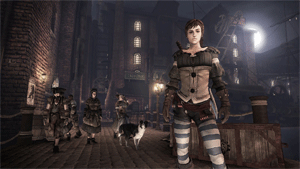Fable III is not a game with many shades of gray. By and large, the decisions you face always have a heavily-signposted ‘good’ or ‘evil’ option with nothing in between. It’s a cartoonish, black and white view of the world and the consequences are largely the same each time: pick the good option and the people will love you, but at a high economic cost which later translates to a high human cost. Pick the bad option and you’ll be hated, but lives will be saved in the long run. It’s a paternalistic perspective that treats the general population as children, who may lash out at being treated severely but ultimately aren’t capable of seeing that it’s for their own good.
 Putting to one side the merits (or lack thereof) of this perspective, perhaps the most interesting moral decision you face is at the very start of the game. Your character, the younger sibling of the tyrannical king, has the power of life and death forced upon them: one must choose who to save between a romantic interest and a larger group of anonymous citizens.
Putting to one side the merits (or lack thereof) of this perspective, perhaps the most interesting moral decision you face is at the very start of the game. Your character, the younger sibling of the tyrannical king, has the power of life and death forced upon them: one must choose who to save between a romantic interest and a larger group of anonymous citizens.
This is a decision reminiscent of that offered to the player during the end of Fable II, where the player was offered a reward upon completing the game: the resurrection of the thousands of characters that had died through the narrative, or the resurrection of the character’s dog. I chose the dog; never even considered bringing back the thousands of people that I had never met. The dog had been by my side since the very start of the game, helping me find treasure, learning tricks, acting as a constant companion and fighting alongside me, protecting me and being in turn protected by me. When my character was absent for several years, the dog waited for me. The dog saves my life. Why wouldn’t I bring back the dog? Fuck the people.
 The difference between the climactic descion of Fable II and the initial decision of Fable III is that in the former, I — the player, not the character — genuinely cared about my dog. In the latter, I don’t care about any of these characters yet — I’ve only just met them. This makes the descion far more abstract and unemotional than it ought to be, turning it into a question of numbers — do I save the one, or save the many?
The difference between the climactic descion of Fable II and the initial decision of Fable III is that in the former, I — the player, not the character — genuinely cared about my dog. In the latter, I don’t care about any of these characters yet — I’ve only just met them. This makes the descion far more abstract and unemotional than it ought to be, turning it into a question of numbers — do I save the one, or save the many?
What makes the question more interesting is the third option, which isn’t immediately apparent — the player can refuse to make a choice, in which case both the one and the many die, and this really underscores the point made earlier, that the most moral decision will also be the most destructive.
By choosing one life over another, the player makes themselves complicit in the action. The narrative of the game explictitly condemns the tyranny, and the notion of having absolute power over life and death; it’s hypocrisy if your character then chooses to exercise this power. The most moral action in this story is probably just to walk away; more people die, but at the hands of someone else, not at yours.
My choice? I chose to save the one. Fuck the many.